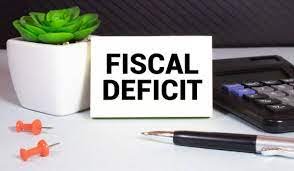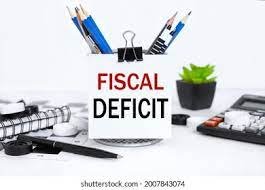India’s Fiscal Deficit Reaches 45% of FY24 Target in 7 Months
India has recently encountered a notable fiscal development as the fiscal deficit reached 45% of the target set for the fiscal year 2023-24 within just seven months. This revelation, disclosed by the Controller General of Accounts (CGA), has sparked discussions and concerns within financial circles and the government machinery. The fiscal deficit, amounting to a significant proportion of the annual target in such a short duration, has raised eyebrows and prompted considerations for strategic financial management.
The fiscal deficit is a critical parameter that measures the variance between the government’s total spending and its total revenue collection. It is a crucial indicator of the country’s economic health, reflecting the government’s borrowing requirements to meet expenditure beyond its revenue. India’s fiscal deficit hitting the 45% mark of the yearly target in the initial seven months implies potential financial challenges that warrant urgent attention.

Why this News is important
Concerns on Fiscal Health
India’s fiscal deficit reaching 45% of the annual target in just seven months raises significant concerns about the nation’s fiscal health. This rapid accumulation indicates potential financial strains and the necessity for immediate corrective measures.
Economic Implications
Such a substantial fiscal deficit may have repercussions on the overall economy, including inflationary pressures, increased government borrowing, and possible impacts on credit ratings, thereby influencing borrowing costs.
Historical context
The fiscal deficit has been a long-standing concern in India’s economic landscape. Historically, managing the deficit has been a challenging task for policymakers due to various factors such as unplanned expenditures, subsidy burdens, and revenue shortfalls. Despite periodic attempts to rein in the deficit, achieving fiscal prudence has remained a persistent challenge.
Key Takeaways from “India’s Fiscal Deficit Reaches 45% of FY24 Target in 7 Months”
| Serial Number | Key Takeaway |
|---|---|
| 1. | India’s fiscal deficit has hit 45% of the FY24 target within seven months, raising alarms within financial circles. |
| 2. | The fiscal deficit measures the variance between the government’s spending and revenue, indicating potential borrowing requirements beyond income. |
| 3. | This development accentuates the need for meticulous fiscal planning and robust economic policies to manage revenue and expenditure effectively. |
| 4. | The rapid accumulation of the deficit emphasizes the urgency for policymakers to implement corrective measures to ensure fiscal stability. |
| 5. | Historically, managing the fiscal deficit has been a persistent challenge for India, requiring sustained efforts for effective financial management. |
Important FAQs for Students from this News
1. What is Fiscal Deficit?
Fiscal deficit represents the gap between the government’s total expenditure and its total revenue (excluding borrowings) during a fiscal year. It indicates the borrowing requirements of the government to meet its expenditure beyond its revenue.
2. How does Fiscal Deficit impact the economy?
A high fiscal deficit can lead to various economic challenges like inflationary pressures, increased government borrowing which can crowd out private investment, and affect credit ratings, leading to higher borrowing costs.
3. Why is managing Fiscal Deficit crucial for a country?
Managing fiscal deficit is crucial as it ensures financial stability by preventing excessive borrowing, inflation, and interest rate hikes, thereby maintaining economic growth and stability.
4. What are the causes contributing to India’s fiscal deficit?
Factors contributing to India’s fiscal deficit include unplanned expenditures, subsidy burdens, revenue shortfalls, and sometimes, inadequate fiscal discipline.
5. How can policymakers address a high fiscal deficit?
Policymakers can address high fiscal deficits through prudent fiscal management, effective revenue generation, rationalizing expenditure, reducing unnecessary subsidies, and promoting economic growth to increase revenue.
Some Important Current Affairs Links


















